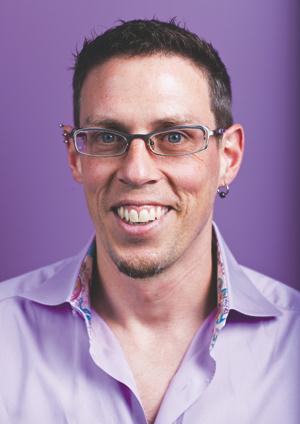“After the merger conversations there was a mandate — we had to get stabilized, positions filled, word out to the community, find a better accessible space,” says Murray Jose, who has been the executive director of PWA for the past seven years. “So many services are in old crumbly basements. What does a safe space mean? Light, warm and welcoming — feeling worthy. We did come into our own a little bit.”
Jose is rightfully proud of the space at 200 Gerrard St, where clients and visitors are at ease as soon as they walk through the doors. Stigma or not, there are some serious smiles on everyone involved.
“We did strategic planning last year and found two key areas to explore,” Jose says. “Health promotion in a holistic fashion — we already do but need to be more intentional. There is no info on why some live longer and healthier lives. We think it’s complementary therapies that help them stay focused and relaxed.
“The other is engagement. The value of having people with AIDS involved in every aspect of what we do. It can’t be tokenism; it has to be concrete and at every level — the majority of the board, several executive directors, including myself, many of the staff and many of the volunteers. It had evolved naturally, but now we’re more intentional about it. Our first focus is providing services, putting food on the table, but we can effect change beyond our clients. Engagement across the spectrum. This was new to us. People can develop skills and move into a position or back to work. We’re not just providing direct services.”
Jose also speaks about poz prevention (“not ‘You HIV-positive people wear condoms,’ but by recognizing and supporting everyone’s sexual health”), advocacy (there was a “session where we matched medical students and PHAs in dinners and one on one. The medical system still doesn’t have it right; there are horror stories that should be 20 years ago. PHAs have actually stepped in and filled the gap”), the Speakers Bureau (“When a volunteer goes out into the community to speak, we can’t just throw them out there. We can’t set them up for failure”) and fighting stigma (“When online cruising you read something like ‘Clean, you be too.’ That’s just wrong”). The words and ideas flow naturally and quickly, and Jose’s passion is obvious. “And how do we make it better?” is tagged on to many sentences.
“The other theme that emerged was dreaming,” Jose says of the strategic planning session. “We were hearing that PHAs were putting their dreams on hold. They were not feeling worthy.” For PHAs, just surviving can be all-consuming. “It impacts their ability to go to bars, to have a relationship.” If PWA can take some of the pressure off, then PHAs can begin to dream again.
“I’ve been 18 years in the public health sector, and there is still so much to keep me challenged. Our only clients are PHAs. We are a PHA-driven organization. What does it mean to live positively? What is the vision of what we can offer? This is an amazing place to work. We have great skills and knowledge, but if we see someone as a client or a number and not someone to learn from, then we’re not doing it right. We’ve updated our mission to broader social change.”

 Why you can trust Xtra
Why you can trust Xtra


